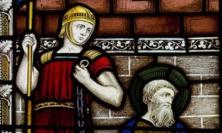Paul’s experience on the Road to Damascus was far from an isolated event in his life or the life of the Church, says Fr Harry Elias. It was the first step on a path of an ongoing conversion which we are called to continue today.
For Paul, there was only one God: the God of Israel. The God who made covenants with Noah, Abraham and David, and promised a Kingdom where He Himself will rule. It was this God, the God of Paul’s ancestors, ‘who had set me apart before I was born and called me’ and ‘through his grace was pleased to reveal his Son to [or in] me so that I might proclaim him among the Gentiles.’ (Galatians 1:15-16).
This is important for our understanding of what happened to Paul on the Damascus Road. He did not find a new God; he met, in Jesus, the risen Lord (see, for example, Acts 22:6-11). What did this mean for Paul, and what does it mean for us?
Paul’s recognition of Jesus as risen Lord meant a conversion in his reading of the scriptures that he knew so well already. His new reading drew on the early Church’s conviction that Jesus’s life, death and resurrection had been foretold, had happened ‘according to the scriptures’ (1Corinthians 15:3-4), as well as on early Jewish Christian apologetic, reflected for example in the speech of Stephen (Acts 7). Paul began to read those scriptures as prefigurations, echoes, of the coming of Christ, convinced now that Christ was the telos or fulfilment of the Law (Romans 10:4), the fulfilment of the narrative of God’s covenantal faithfulness in the new covenant through which God would ‘take away [Israel’s] sins’(Romans 11:27).
A striking example of Paul’s reading of the scriptures with Christ as telos is in a passage from Galatians in which Paul connects strongly with his mission to the Gentiles. He argues that through Christ, all nations gain blessings for themselves, and furthermore, even become co-heirs of God’s promise to Abraham: he saw in a new light the fulfilment of the promise made to Abraham and his ‘seed’. Although this ‘seed’ was generally understood to be as numerous as the stars of heaven or as the dust of the earth (Genesis 26:4, 28:13-14), Paul identifies it first of all as one person, Christ (Galatians 3:16). Thus, he argues, the implementation of the promise was not through Moses and the Law, but in the seed that is Christ, because the seed of God could not be a mediator (of Gods), as Moses was of angels, since God is one (Galatians 3:19-20). He takes for granted that Christ is the Son of God (Galatians 4:4). His argument may seem tortuous, but his confidence rests above all on revelation by the Spirit, not only to him but also to the apostles and prophets (Ephesians 3:1-6).
Paul insisted that no practice – notably food laws nor the practice of circumcision, which for the Jews was their badge of identity as the chosen people – should stand in the way of Gentile believers being regarded as the brethren of the Lord and so of Jewish believers. Nowadays, the Spirit seems to be asking us not to allow any differences to stand in the way of treating every creature as the brethren of the Lord and thereby our brothers and sisters as well. The groundbreaking Vatican II Document Nostra Aetate says (§5) ‘We cannot truly call on God, the Father of all, if we refuse to treat in a brotherly way any man, created as he is in the image of God.’ In line with this, Pope Francis in his encyclical Laudato si’ points out: ‘Everything is related, and we human beings are united as brothers and sisters on a wonderful pilgrimage’ (§92), and in that union he includes our Sister, Mother Earth (§1).
It seems to me possible to approach others not only as our brothers and sisters in the one creation but also as sharers of a common hope. Paul’s initial approach to the Corinthians was: ‘to know nothing among you except Jesus Christ, and him crucified’ (1 Corinthians 2:2). Paul compared the faith of the crucified Christ to the faith of Abraham in the God ‘who gives life to the dead and calls into existence the things that do not exist’, hoping against hope in God’s promise to him being fulfilled (Romans 4:17,18,21). This kind of hope arises indeed out of the human condition faced as it is with grief over sin, loss and death. I myself ground this hope in my faith in the crucified and risen Lord but I thank God for his merciful love in granting this hope to others no matter what faith they would ground it in.
History shows us just how difficult it is to change an identity built into us through the centuries in order to include those who are not only very different in their practices but in the past have been treated as enemies. Paul had to face bitter opposition and even threats of assassination – both from those who felt circumcision and food laws were essential requirements, as well as from rulers who saw belief that Jesus is Lord undermining worship of Caesar and the stability of civic life. Even now, for Christians with different backgrounds, to live up to an identity which is to be all inclusive, where all are one in Christ through faith (Galatians 3:26-28), is a slow and painful process. However, the effect of two sides reaching out to each other in the rereading of their own and one another’s narratives (as well as in practical matters) - a rereading that is continually ‘on pilgrimage’- of itself creates brotherly ties, besides driving out the exclusiveness in our hearts and in our different narratives regarding God’s mercy. In any such efforts, then, we can be said to be continuing Paul’s conversion so as to enable the new creation to inch closer to the completion of Christ’s mission when the One God appears by becoming all in all (1Corinthians 15:28).
Harry Elias SJ assists in the Hurtado Jesuit Centre in Wapping, East London.






